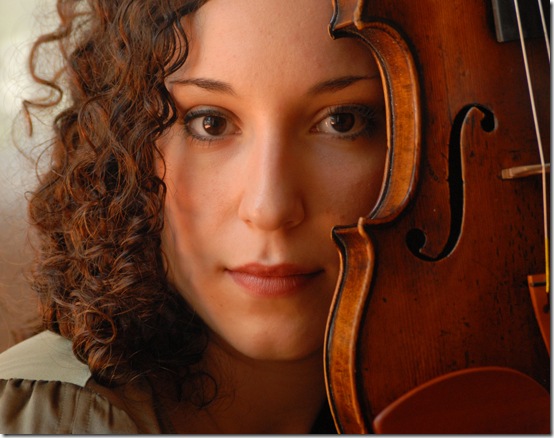The Boca Raton Symphonia closed its 2012-13 season Sunday with a too-little-heard major concerto and a genial reading of a major symphony, securing a solid planetary foothold amid the constellation of local chamber orchestras that appeared in the wake of the Florida Philharmonic’s Big Bang.
Let by guest conductor Constantine Kitsopoulos, who directed the group last month at the Festival of the Arts Boca, the Symphonia welcomed to the Roberts Theater the young violinist Ilana Setapen, a 29-year-old Texan who is the current associate concertmaster of the Milwaukee Symphony Orchestra.
Setapen played the Violin Concerto (in A minor, Op. 53) of Antonin Dvořák, a great concerto that doesn’t always get its due, perhaps because of its formidable difficulties (Dvořák was a fine violist and knew his way around the fingerboard). This was Setapen’s first live performance of the concerto, and there was some noticeable tentativeness about her playing overall that will likely clear up with repeated readings.
Although Setapen finished off some of her showier virtuoso passages with flourishes of the bow, holding it straight up conquering-heroine style, she is not a particularly flashy player. Rather, she is solid, diligent and thorough, and she plays with a big, wide, forceful sound. Her technique is impressive, and her love of laying out fat tone in the pursuit of heartfelt emotion (as she demonstrated in the second movement) is plain to see and hear.
The opening movement got off to something of a sluggish start in the orchestra; it’s a perfunctory opening that needs to be punchy and almost strident to work properly. And Setapen’s terminal top notes in the first bravura passages were less than precise, which is exactly the kind of thing that should improve the next time she plays the work. Initial shakiness out of the way, orchestra and soloist came together for an expansive, almost stately version of the first movement.
Setapen dug deeply into her instrument for the first bars of the slow movement, giving the music a beautiful, soulful reading that was tastefully complemented by lovely woodwind playing. The rest of the movement had strong, committed interplay from soloist and orchestra, and made it the heart of the whole concerto.
The syncopated, Czech-dance theme of the finale was accurate and high-spirited, but also quite cautious and relatively earthbound. It could have used much more fire and lightness, with some spring in those dance steps and an attitude of joy. It was perfectly enjoyable and well-played, but not especially lived-in. Setapen, though, has the chops and the commitment to make a much more confident presentation of this concerto at some future date, and it will be a pleasure to hear her do it then.
The concert opened with Amadeus ex Machina, a cheeky take on the Mozart Symphony No. 40 by the American composer Lawrence Dillon. I’ve heard it a couple times before on other programs, and it appears to have become popular as a piece of contemporary music that conservatively oriented orchestras can present, in part because it has good buy-in with an audience familiar with Mozart.
It’s a difficult piece, however, and not humorous in the way of something like Rodion Shchedrin’s Carmen Suite, which the Boca Symphonia presented at its previous concert. It’s a more delicately balanced work than that, in some ways reminiscent of the coloristic approach of a composer like Webern. The orchestra didn’t seem to get the hang of the piece in any meaningful way, and it sounded labored rather than whimsical.
The concert ended with the Eighth Symphony of Beethoven (in F, Op. 93), and here the Symphonia sounded comfortable and relaxed. Its first movement was big and bold, full and muscular, and very engagingly done, with its musicians playing mostly full-on all the way through.
The second movement, a tribute to the metronome, was charming and skillful, and the Minuet had the same genial richness as the first, though the trio had noticeable horn flubs. The finale, in which Beethoven is at his jokiest, was crisp and witty, well-conducted and aggressively played.
It was a nice sendoff for the season, and suggests that compact symphonies are a good choice for this orchestra, one that shows off the skill of its veteran players to best effect.
2014 season announced
The Boca Symphonia’s four-concert upcoming season begins Jan. 12, 2014, with former music director Alexander Platt returning to lead pianist William Wolfram in the Shostakovich Piano Concerto No. 1 (with trumpeter Jeffrey Kaye), Rossini’s La Scala di Seta overture, and the Schubert Sixth Symphony. Philippe Entremont returns Feb. 9 in a concert of music by Corigliano (Voyage) and Beethoven (Symphony No. 4), with French pianist Elodie Vignon in the Chopin Second Concerto.
Former Florida Philharmonic Orchestra director James Judd comes to the Roberts Theater on March 16 with violinist Elmar Oliveira for the Beethoven Violin Concerto, Barber’s Serenade for Strings, and the Haydn Surprise Symphony (No. 94 in G). Former Seattle Symphony director Gerard Schwarz makes a return appearance April 6 in an all-Mozart program featuring clarinetist Jon Manasse in the Clarinet Concerto. Also on the program is the Posthorn Serenade (in D) and the Jupiter Symphony (No. 41 in C).
For more information, or to subscribe, call 1-866-687-4201 or send an email to tickets@bocasymphonia.org.
